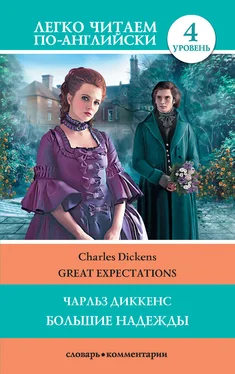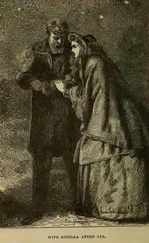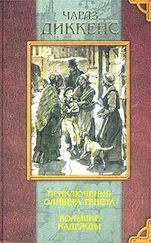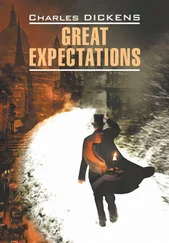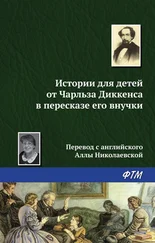When she came to that, and to a wild cry that followed that, I caught her round the waist. For she rose up in the chair, in her dress, and struck at the air.
All this passed in a few seconds. As I drew her down into her chair, I saw my guardian in the room.
Miss Havisham had seen him as soon as I, and was (like everybody else) afraid of him. She made a strong attempt to compose herself, and stammered that he was as punctual as ever.
“As punctual as ever,” he repeated, coming up to us. “(How do you do, Pip? Shall I give you a ride, Miss Havisham? Once round?) And so you are here, Pip?”
I told him when I had arrived, and how Miss Havisham had wished me to come and see Estella. To which he replied, “Ah! Very fine young lady!” Then he pushed Miss Havisham in her chair before him, with one of his large hands, and put the other in his trousers-pocket.
“Well, Pip! How often have you seen Miss Estella before?” said he, when he came to a stop.
“How often?”
“Ah! How many times? Ten thousand times?”
“Oh! Certainly not so many.”
“Twice?”
“Jaggers,” interposed Miss Havisham, much to my relief, “leave my Pip alone, and go with him to your dinner.”
We groped our way down the dark stairs together.
“Pray, sir,” said I, “may I ask you a question?”
“You may,” said he, “and I may decline to answer it. Put your question.”
“Estella’s name. Is it Havisham or —?” I had nothing to add.
“Or what?” said he.
“Is it Havisham?”
“It is Havisham.”
We played until nine o’clock, and then it was arranged that when Estella came to London I should be forewarned of her coming and should meet her at the coach; and then I took leave of her, and touched her and left her.
My guardian lay at the Boar in the next room to mine. Far into the night, Miss Havisham’s words, “Love her, love her, love her!” sounded in my ears. I adapted them for my own repetition, and said to my pillow, “I love her, I love her, I love her!” hundreds of times.
Ah me! I thought those were high and great emotions. But I never thought there was anything low and small in my keeping away from Joe, because I knew she would be contemptuous of him. Joe had brought the tears into my eyes; they had soon dried, God forgive me! soon dried.
The coach, with Mr. Jaggers inside, came up in due time, and I took my box-seat again, and arrived in London safe – but not sound, for my heart was gone. As soon as I arrived, I sent a codfish and barrel of oysters to Joe, and then went on to Barnard’s Inn.
I found Herbert dining on cold meat, and delighted to welcome me back. I felt that I must open my breast that very evening to my friend.
Dinner done and we sitting with our feet upon the fender, I said to Herbert, “My dear Herbert, I have something very particular to tell you.”
“My dear Handel,” he returned, “I shall esteem and respect your confidence.”
“It concerns myself, Herbert,” said I, “and one other person.”
Herbert crossed his feet, looked at the fire with his head on one side, and looked at me because I didn’t go on.
“Herbert,” said I, laying my hand upon his knee, “I love – I adore – Estella.”
Herbert replied in an easy way, “Exactly. Well?”
“Well, Herbert? Is that all you say? Well?”
“What next, I mean?” said Herbert. “Of course I know that.”
“How do you know it?” said I.
“How do I know it, Handel? Why, from you.”
“I never told you.”
“Told me! You have always adored her, ever since I have known you. You brought your adoration and your bag here together. Told me! Why, you have always told me all day long. When you told me your own story, you told me plainly that you began adoring her the first time you saw her, when you were very young indeed.”
“Very well, then,” said I, to whom this was a new and not unwelcome light, “I have never left off adoring her. And she has come back, a most beautiful and most elegant creature. And I saw her yesterday. And if I adored her before, I now adore her more and more.”
“Lucky for you then, Handel,” said Herbert, “Have you any idea yet, of Estella’s views on the adoration question?”
I shook my head. “Oh! She is thousands of miles away, from me,” said I.
“Patience, my dear Handel: time enough, [153]time enough.”
“What a hopeful disposition you have!” said I, admiring his cheery ways.
“I ought to have,” said Herbert, “for I have not much else. I was going to say a word or two, Handel, concerning my feelings.”
“Then you are? [154]” said I.
“I am,” said Herbert; “but it’s a secret.”
I assured him of my keeping the secret.
“May I ask the name?” I said.
“Name of Clara,” said Herbert.
“Live in London?”
“Yes. Perhaps I ought to mention,” said Herbert, “that she is rather below my mother’s family notions. Her father is an invalid now.”
“Living on —?”
“On the first floor,” said Herbert. Which was not at all what I meant, for I had intended my question to apply to his means. “I have never seen him, since I have known Clara. But I have heard him constantly. He makes tremendous rows – roars, and pegs at the floor with some frightful instrument.” Herbert looked at me and then laughed heartily.
At night I miserably thought of Estella, and miserably dreamed that my expectations were all cancelled, and that I had to give my hand in marriage to Herbert’s Clara, or play Hamlet before twenty thousand people, without knowing twenty words of it.
One day when I was busy with my books and Mr. Pocket, I received a note by the post. It had no beginning, as Dear Mr. Pip, or Dear Pip, or Dear Sir, or Dear Anything, but ran thus: —
“I am to come to London the day after tomorrow by the midday coach. I believe it was settled you should meet me? At all events Miss Havisham has that impression, and I write in obedience to it. She sends you her regard.
Yours, ESTELLA.”
If there had been time, I should probably have ordered several suits of clothes for this occasion. My appetite vanished instantly, and I knew no peace or rest until the day arrived. I was worse than ever, and began haunting the coach-office in Wood Street, Cheapside, before the coach had left the Blue Boar in our town. I had performed the first half-hour of a watch of four or five hours, when Wemmick ran against me.
“Halloa, Mr. Pip,” said he; “how do you do?”
I explained that I was waiting to meet somebody who was coming up by coach, and I inquired after the Castle and the Aged.
“Both flourishing thank you,” said Wemmick, “and particularly the Aged. He’s a wonderful father. He’ll be eighty-two next birthday. I plan to fire eighty-two times. Where do you think I am going to?”
“To the office?” said I, for he was tending in that direction.
“Next thing to it,” returned Wemmick, “I am going to Newgate. Mr. Pip! Would you like to have a look at Newgate? Have you time to spare?”
I had so much time to spare, that the proposal came as a relief. I joined Mr. Wemmick, and I had received, accepted his offer.
We were at Newgate in a few minutes, and we passed through the lodge into the interior of the jail. It was visiting time when Wemmick took me in, and the prisoners, behind bars in yards, were talking to friends; and a frowzy, ugly, disorderly, depressing scene it was.
It struck me that Wemmick walked among the prisoners much as a gardener might walk among his plants. He was saying, “What, Captain Tom? Are you there? Ah, indeed!” and also, “Is that Black Bill behind the cistern? Why I didn’t look for you these two months; how do you find yourself? [155]” Wemmick was highly popular.
Читать дальше
Конец ознакомительного отрывка
Купить книгу
